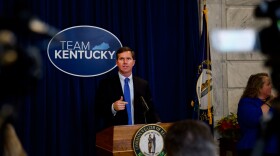Jefferson County Public Schools (JCPS) superintendent Marty Pollio told state legislators on Tuesday that maintaining state funding for Kentucky schools will be critical to improving outcomes for Black students and other students of color in JCPS. His warning comes as the state braces for massive budget shortfalls in the coming fiscal year due to the coronavirus pandemic.
"I know that you face a tough budget year coming up," Pollio told lawmakers during an education committee meeting. Pollio asked lawmakers to do "whatever can be done to continue funding at the current level."
Gov. Andy Beshear has predicted a $1.1 billion budget shortfall for this fiscal year, if no relief is provided to the states by the federal government. More than half of the state's$11.8 billion budget goes to K-12 and higher education (52.4 %), and education leaders say that means any cuts will be felt deeply in the education sector.
Pollio was addressing the committee during a discussion about the district's efforts at improving outcomes for Black students and students of color, under its Racial Equity Plan, approved in 2018.
He compared the current health and economic crisis to the Great Recession.
"When I look back at 2007-2008 when we had the recession, I think we undervalued the impact that has had on education and achievement across the country, and specifically with the achievement gap in Black students. And so as we are now in this COVID-19 crisis, I think the 2020's will be marked in the same way about how we respond," he said.
State funding per pupil was still down nearly 16% in 2018, 10 years after the height of the recession prompted major cuts to education.
"We need to be much more intentional about COVID-19 and how it's going to impact our students for the next decade, and specifically students of color," Pollio said.
He worried that cuts will come at a time when all students will need a high level of support, having spent months in remote learning, and in home situations made more difficult because of the pandemic.
"They're going to have greater needs than they ever have had before," he said, especially when it comes to mental health. The district has recently taken steps to place a counselor or mental health professional in every single JCPS school.
"But you know those will be the things that will have to be cut...so that we can keep teachers in the classroom. So I would highly encourage anything that can be done," he said.
One lawmaker, Sen. Stephen Meredith (R-Leitchfield), suggested that "ending busing" could help the district save money.
"Would those dollars not be better spent investing in neighborhood schools, in preschool?" he asked.
Since 1975, JCPS has sought to racially integrate schools by busing students to schools outside of their neighborhoods, which are highly segregated. "Ending busing" and "neighborhood schools" are common refrains heard from parents, community members and white supremacists who have opposed integration.
Pollio replied that the district's proposed student assignment plan would allow students in Louisville's majority Black West End to stay in their neighborhood. This would reduce the number of students traveling across town. But it will not save the district money. In fact, it will cost hundreds of millions of dollars to implement, because the change will require JCPS to build up to three new schools in the West End.






